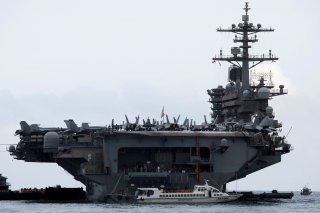The Navy Must Learn From Coronavirus' Attack On The USS Theodore Roosevelt
The politicians and media people and armchair generals who criticized Acting Secretary Modly’s handling of Crozier never were working in full consideration of the facts.
Again, as of this writing, some 2000 of an anticipated 3000+ of the crew needing removal have been moved into hotels on Guam, and still, there are no hospitalizations. The ship is being thoroughly cleaned. What are the lessons and takeaways here?
- Clearly, Captain Crozier is to be commended for his fanatical commitment to the health and well-being of his crew. Further, he has had a stellar career, and one hopes this one incident is not a cause for exiting the U.S. Navy he loves; life is full of second chances.
- But the politicians and media people and armchair generals who criticized Acting Secretary Modly’s handling of Crozier never were working in full consideration of the facts. They were not aware of the communications directly between Crozier and Modly and his team, or of their 24/7 avail for Crozier; nor of the proximity of Rear Admiral Baker to Crozier; nor of the consternation and morale hit to the crew and their families, and the broader Navy family, all caused by Crozier’s letter; nor of the strategic consequences of widespread knowledge of compromised American naval power in the western Pacific, in the tense moments of the present. For President Trump and Secretary Esper to ignore all these factors, and to give in to the Beltway media bonfire stoked against Secretary Modly, is shameful, and a dereliction of leadership in its own right.
- Coolness under pressure, especially aboard a nuclear aircraft carrier, is of paramount importance now, as the United States works through the most serious pandemic challenge in a century, something de novo for all of us, but nonetheless unavoidable: quite simply, Captain Crozier left Secretary Modly with no choice but to remove him. To express this differently, if Crozier had given Modly or his chief of staff an itemized list of requests and been ignored, or if Admiral Baker had for some reason inexplicably muzzled him in an attempt to draw the Navy’s attention to his plight, his actions would be seen as admirable, even heroic. But as Modly has explained, first in his press conferences of March 27th and April 2nd and then in multiple media appearances since, the Navy was, in fact, acting swiftly and along the lines as talked about and needed by Crozier. This lack of judgment in Crozier while under extreme pressure is what led Modly to lose confidence in him and relieve him of command.
But the media has ignored virtually the entirety of the details here, or their timing, and hence the picture painted to the masses, capstoned by the cheering crew as their captain departed down the gangway, is a distorted one. It is egregious that Secretary Modly has been removed for making a tough call solely because of the media-fed bonfire and Democrat critics exploiting this as another opportunity to attack Trump. That is, if there had been NO media or Democrat screams, Secretary Modly would still have his job. The fecklessness of SecDef Esper here, and frankly of Mr. Trump as well, is palpable.
As for Captain Crozier, to the degree he panicked in a moment of hyper-concern, it’s regrettable, but forgivable given the times: let’s go forward with Crozier again on his way to flag rank, in a reassignment.
Meanwhile, Mr. Modly, himself having led a long and distinguished career of service to his country, will be fine, but the American Taxpayer has lost his valuable services due to yet another all-too-frequent example of Beltway cave-in. There is no human being alive more dedicated to the United States Navy, and Modly was among the Navy's most vociferous advocates for a modernized 350-ship fleet across the 2020s [with three new Ford-class carriers], and how to make it happen cost-effectively.
So, the real leadership lesson? There are two here: first, tough calls are, by definition, never easy, but made in the fullness of all relevant facts, carry their own integrity. Mr. Modly bent over backward to offer Captain Crozier whatever he needed, including a direct line 24/7 availability. The lack of any reach-out to Modly or his staff before sending that viral distress letter that was soon in the pages of the San Francisco Chronicle, as well as the bypassing of Admiral Baker there within feet of Crozier’s quarters, was dispositive. The lack of situational awareness, in terms of how that letter would be received to various audiences (the crew itself, their families, the broader Navy, adversarial powers), was also dispositive. This is tough decision-making we can admire, even if disagreeing on substance. (Having said all this, it is true that if Modly could re-do Monday’s visit to the Roosevelt, he’d surely edit his remarks, which were harsh toward Crozier, stay aboard much longer than his 30-minute visit, and take direct questions from the crew. But however infelicitously handled his visit, it changes none of the events that led to Crozier’s unfortunate removal.)
And the second lesson here, specific to the ways of Washington: it is sheer folly for Messrs. Trump and Esper to give in to the howlings of arrogant but clueless ruling class critics inside the Beltway, who will scream epithets at someone like Modly at every opportunity, almost always, as here, in total ignorance of the facts of the case. Once again, the American Taxpayer is the loser, when good people forfeit their jobs thanks to overt political circumstances and cowardice in the face of Beltway bonfires.
Perhaps someone should remind Secretary Esper of the Navy’s motto: Honor, Courage, and Commitment. Good character traits to live by.
Mr. Chapman is an economist and investor in Washington.
This article first appeared at Real Clear Defense.
Image: Reuters.

